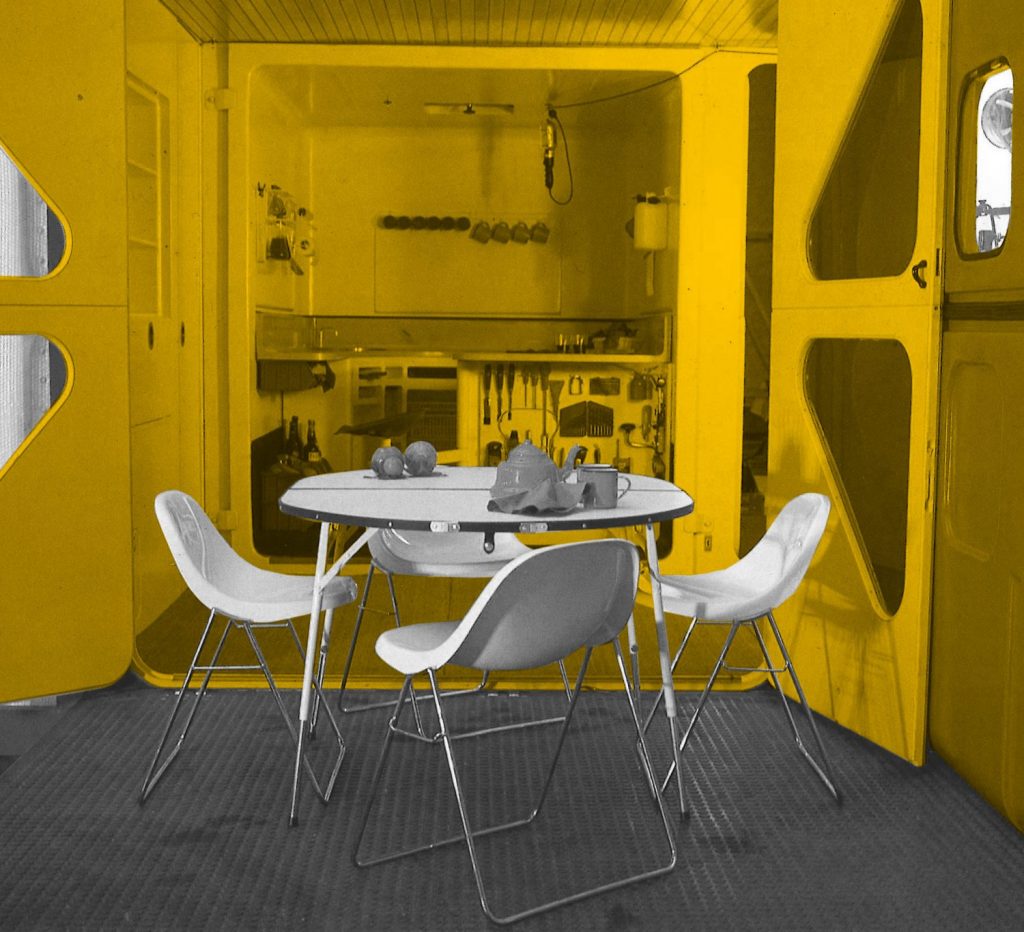Call for contributions

Richard Sapper, Marco Zanuso, Mobile Housing Unit, per la mostra
Italy: The new domestic Landscape. MoMA 1972
Tutt* noi stiamo vivendo un tempo straordinario, doloroso e traumatico per molt*, di sospensione per altr*, caratterizzato dalla noia e dalla ripetitività delle giornate per altr* ancora.
Sono tuttavia tempi in cui stanno anche avvenendo trasformazioni radicali e profonde, che molto probabilmente lasceranno un segno anche dopo che l’emergenza verrà superata.
A causa delle (sacrosante) restrizioni che costringono in casa la maggior parte de* cittadin* in questo periodo, lo spazio domestico sta necessariamente sostituendo lo spazio pubblico.
Restare a casa è diventato un atto pubblico e politico, per quanto anche solo fino a un mese fa non avremmo mai immaginato che la cura per la collettività si sarebbe potuta esprimere attraverso l’isolamento: per stare vicino al prossimo, soprattutto ai soggetti più deboli, dobbiamo stare distanti. Stare in casa è oggi una manifestazione di rispetto nei confronti della salute pubblica.
Al contempo però non sempre (non tutte) le case sono in grado di rispondere ai bisogni che questo isolamento impone, non tutte le case sono il luogo che avremmo voluto rendere pubblico, non tutte le famiglie sono disposte a condividere tra i vari membri tutti i momenti delle proprie giornate. Diventa complesso trovare un angolo di privacy nel quale raccogliersi o fare una telefonata privata, a volte imbarazzante decidere cosa la web-cam dovrà inquadrare durante le riunioni, angosciante la sovrapposizione del lavoro di produzione con quello di riproduzione.
Stiamo chiedendo alle nostre case di piegarsi a una nuova necessità, senza che sia chiaro fino a quando le nostre vite saranno organizzate in questo modo.
Per queste ragioni ci sembra importante fotografare questo momento, questa fase di forzatura delle nostre quotidianità che – speriamo – difficilmente si ripeterà. E per queste ragioni vi chiediamo di aiutarci a capire come ognun* sta affrontando questo momento.
Raccontaci come il tuo spazio domestico si è trasformato per fare spazio alle mutate esigenze di questo periodo e quali credi saranno le tracce permanenti che questa trasformazione porterà con sé. Raccontaci degli spazi della tua casa, del rapporto con i tuoi familiari in questa fase di convivenza intensiva e forzata, raccontaci dei tuoi spazi di privacy (reali o desiderati), e di come presenti te stess* e la tua casa agli altri quando – se – devi partecipare a una video-conferenza.
Invia la tua testimonianza con un video, una sequenza, una foto, un testo, un disegno alla nostra casella di posta sexandthecity.milano2020@gmail.com, indicandoci il tuo nome o nickname e città. Ci sarà utile per comprendere la diversità delle storie che ognun* sta vivendo.
Con l’invio del materiale se ne autorizza l’utilizzo su canali social e stampa relativi al progetto Sex & the City. Nel caso non voleste rendere pubblico il vostro contributo, vi preghiamo di esplicitarlo.
***
Call for contributions
We are all experiencing an extraordinary time, painful and traumatic for many, of suspension for others, characterized by boredom and the repetitiveness of the days for others.
However, these are times when radical and profound transformations are also taking place, which will most likely leave a mark even after the emergency is overcome.
Due to the (sacrosanct) restrictions that force most of the * citizens * at home in this period, the domestic space is necessarily replacing the public space.
Staying at home has become a public and political act, although even up to a month ago we would never have imagined that the cure for the community could have been expressed through isolation: to be close to others, especially to the weakest subjects, we must keep a distance. Staying at home is today a manifestation of respect for public health.
At the same time, however not always (not all) the houses are able to respond to the needs that this isolation imposes, not all the houses are the place we wanted to make public, not all the families are willing to share among the various members all the moments of one’s days. It becomes complex to find a corner of privacy in which to gather or make a private phone call, sometimes embarrassing to decide what the web-cam will have to frame during the meetings, anguishing the overlap of the production work with that of reproduction.
We are asking our homes to bend to a new need, without it being clear until our lives are organized in this way.
For these reasons, it seems important to us to photograph this moment, this phase of forcing our daily lives which – we hope – will hardly be repeated. And for these reasons we ask you to help us understand how everyone is facing this moment.
Tell us how your domestic space has changed to make room for the changing needs of this period and what you believe will be the permanent traces that this transformation will bring. Tell us about the spaces of your home, about the relationship with your family in this phase of intensive and forced coexistence, tell us about your privacy spaces (real or desired), and how you present yourself and your home to others when – if – you must participate in a video conference.
Send your testimony with a video, a sequence, a photo, a text, a drawing to our mailbox sexandthecity.milano2020@gmail.com, by telling us your name or nickname and city. It will be useful for us to understand the diversity of the stories that each one is experiencing.
By submitting the material you authorize its use on social and press channels related to the project Sex & the City.We ask you to let us know in case you don’t want to make your contribution public.
